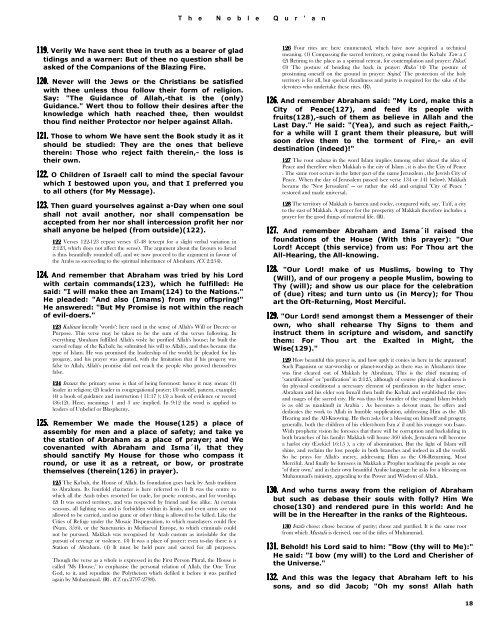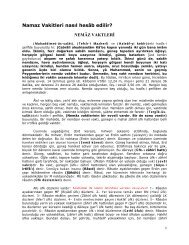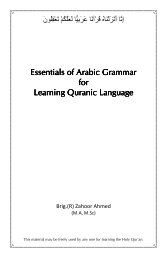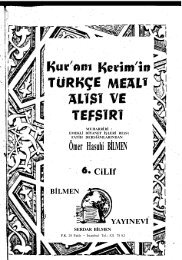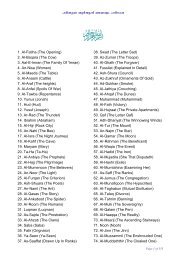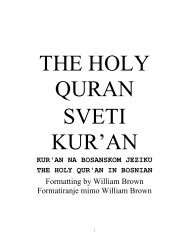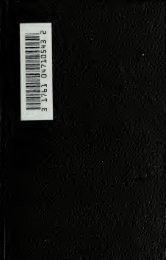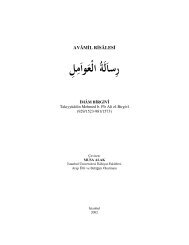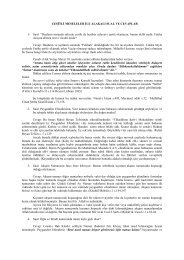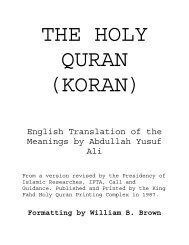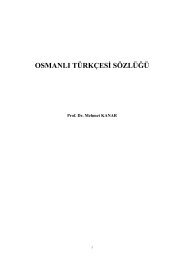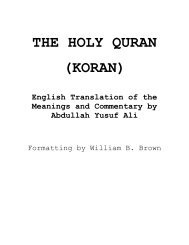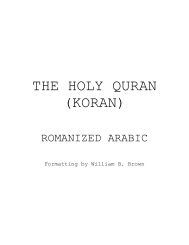English Quran with Commentaries By Yusuf-ali - HolyBooks.com
English Quran with Commentaries By Yusuf-ali - HolyBooks.com
English Quran with Commentaries By Yusuf-ali - HolyBooks.com
- No tags were found...
You also want an ePaper? Increase the reach of your titles
YUMPU automatically turns print PDFs into web optimized ePapers that Google loves.
T h e N o b l e Q u r ’ a n<br />
119. Verily We have sent thee in truth as a bearer of glad<br />
tidings and a warner: But of thee no question shall be<br />
asked of the Companions of the Blazing Fire.<br />
120. Never will the Jews or the Christians be satisfied<br />
<strong>with</strong> thee unless thou follow their form of religion.<br />
Say: "The Guidance of Allah,-that is the (only)<br />
Guidance." Wert thou to follow their desires after the<br />
knowledge which hath reached thee, then wouldst<br />
thou find neither Protector nor helper against Allah.<br />
121. Those to whom We have sent the Book study it as it<br />
should be studied: They are the ones that believe<br />
therein: Those who reject faith therein,- the loss is<br />
their own.<br />
122. O Children of Israel! call to mind the special favour<br />
which I bestowed upon you, and that I preferred you<br />
to all others (for My Message).<br />
123. Then guard yourselves against a-Day when one soul<br />
shall not avail another, nor shall <strong>com</strong>pensation be<br />
accepted from her nor shall intercession profit her nor<br />
shall anyone be helped (from outside)(122).<br />
122 Verses 122-123 repeat verses 47-48 (except for a slight verbal variation in<br />
2:123, which does not affect the sense). The argument about the favours to Israel<br />
is thus beautifully rounded off, and we now proceed to the argument in favour of<br />
the Arabs as succeeding to the spiritual inheritance of Abraham. (Cf. 2:254).<br />
124. And remember that Abraham was tried by his Lord<br />
<strong>with</strong> certain <strong>com</strong>mands(123), which he fulfilled: He<br />
said: "I will make thee an Imam(124) to the Nations."<br />
He pleaded: "And also (Imams) from my offspring!"<br />
He answered: "But My Promise is not <strong>with</strong>in the reach<br />
of evil-doers."<br />
123 K<strong>ali</strong>mat literally "words": here used in the sense of Allah's Will or Decree or<br />
Purpose. This verse may be taken to be the sum of the verses following. In<br />
everything Abraham fulfilled Allah's wish: he purified Allah's house; he built the<br />
sacred refuge of the Ka'bah; he submitted his will to Allah's, and thus became the<br />
type of Islam. He was promised the leadership of the world; he pleaded for his<br />
progeny, and his prayer was granted, <strong>with</strong> the limitation that if his progeny was<br />
false to Allah, Allah's promise did not reach the people who proved themselves<br />
false.<br />
124 Imam: the primary sense is that of being foremost: hence it may mean: (1)<br />
leader in religion; (2) leader in congregational prayer; (3) model, pattern, example;<br />
(4) a book of guidance and instruction ( 11:17 ); (5) a book of evidence or record<br />
(36:12). Here, meanings 1 and 3 are implied. In 9:12 the word is applied to<br />
leaders of Unbelief or Blasphemy.<br />
125. Remember We made the House(125) a place of<br />
assembly for men and a place of safety; and take ye<br />
the station of Abraham as a place of prayer; and We<br />
covenanted <strong>with</strong> Abraham and Isma´il, that they<br />
should sanctify My House for those who <strong>com</strong>pass it<br />
round, or use it as a retreat, or bow, or prostrate<br />
themselves (therein(126) in prayer).<br />
125 The Ka'bah, the House of Allah. Its foundation goes back by Arab tradition<br />
to Abraham. Its fourfold character is here referred to (1) It was the centre to<br />
which all the Arab tribes resorted for trade, for poetic contests, and for worship.<br />
(2) It was sacred territory, and was respected by friend and foe <strong>ali</strong>ke. At certain<br />
seasons, all fighting was and is forbidden <strong>with</strong>in its limits, and even arms are not<br />
allowed to be carried, and no game or other thing is allowed to be killed. Like the<br />
Cities of Refuge under the Mosaic Dispensation, to which manslayers could flee<br />
(Num. 35:6), or the Sanctuaries in Mediaeval Europe, to which criminals could<br />
not be pursued. Makkah was recognised by Arab custom as inviolable for the<br />
pursuit of revenge or violence. (3) It was a place of prayer: even to-day there is a<br />
Station of Abraham. (4) It must be held pure and sacred for all purposes.<br />
Though the verse as a whole is expressed in the First Person Plural, the House is<br />
called "My House," to emphasise the personal relation of Allah, the One True<br />
God, to it, and repudiate the Polytheism which defiled it before it was purified<br />
again by Muhammad. (R). (Cf. nn.2797-2798).<br />
126 Four rites are here enumerated, which have now acquired a technical<br />
meaning. (1) Compassing the sacred territory, or going round the Ka'bah: Taw a f.<br />
(2) Retiring to the place as a spiritual retreat, for contemplation and prayer: I'tikaf.<br />
(3) The posture of bending the back in prayer: Ruku' (4) The posture of<br />
prostrating oneself on the ground in prayer: Sujud. The protection of the holy<br />
territory is for all, but special cleanliness and purity is required for the sake of the<br />
devotees who undertake these rites. (R).<br />
126. And remember Abraham said: "My Lord, make this a<br />
City of Peace(127), and feed its people <strong>with</strong><br />
fruits(128),-such of them as believe in Allah and the<br />
Last Day." He said: "(Yea), and such as reject Faith,-<br />
for a while will I grant them their pleasure, but will<br />
soon drive them to the torment of Fire,- an evil<br />
destination (indeed)!"<br />
127 The root salama in the word Islam implies (among other ideas) the idea of<br />
Peace and therefore when Makkah is the city of Islam , it is also the City of Peace<br />
. The same root occurs in the latter part of the name Jerusalem , the Jewish City of<br />
Peace. When the day of Jerusalem passed (see verse 134 or 141 below). Makkah<br />
became the "New Jerusalem" — or rather the old and original "City of Peace "<br />
restored and made universal.<br />
128 The territory of Makkah is barren and rocky, <strong>com</strong>pared <strong>with</strong>, say, Ta'if, a city<br />
to the east of Makkah. A prayer for the prosperity of Makkah therefore includes a<br />
prayer for the good things of material life. (R).<br />
127. And remember Abraham and Isma´il raised the<br />
foundations of the House (With this prayer): "Our<br />
Lord! Accept (this service) from us: For Thou art the<br />
All-Hearing, the All-knowing.<br />
128. "Our Lord! make of us Muslims, bowing to Thy<br />
(Will), and of our progeny a people Muslim, bowing to<br />
Thy (will); and show us our place for the celebration<br />
of (due) rites; and turn unto us (in Mercy); for Thou<br />
art the Oft-Returning, Most Merciful.<br />
129. "Our Lord! send amongst them a Messenger of their<br />
own, who shall rehearse Thy Signs to them and<br />
instruct them in scripture and wisdom, and sanctify<br />
them: For Thou art the Exalted in Might, the<br />
Wise(129)."<br />
129 How beautiful this prayer is, and how aptly it conies in here in the argument!<br />
Such Paganism or star-worship or planet-worship as there was in Abraham's time<br />
was first cleared out of Makkah by Abraham, This is the chief meaning of<br />
"sanctification" or "purification" in 2:125, although of course physical cleanliness is<br />
(in physical conditions) a necessary element of purification in the higher sense.<br />
Abraham and his elder son Isma'il then built the Ka'bah and established the rites<br />
and usages of the sacred city. He was thus the founder of the original Islam (which<br />
is as old as mankind) in Arabia . As be<strong>com</strong>es a devout man, he offers and<br />
dedicates the work to Allah in humble supplication, addressing Him as the All-<br />
Hearing and the All-Knowing. He then asks for a blessing on himself and progeny<br />
generally, both the children of his eldest-born Ism a' il and his younger son Isaac.<br />
With prophetic vision he foresees that there will be corruption and backsliding in<br />
both branches of his family: Makkah will house 360 idols, Jerusalem will be<strong>com</strong>e<br />
a harlot city (Ezekiel 16:15 ), a city of abomination. But the light of Islam will<br />
shine, and reclaim the lost people in both branches and indeed in all the world.<br />
So he prays for Allah's mercy, addressing Him as the Oft-Returning, Most<br />
Merciful. And finally he foresees in Makkah a Prophet teaching the people as one<br />
"of their own." and in their own beautiful Arabic language: he asks for a blessing on<br />
Muhammad's ministry, appe<strong>ali</strong>ng to the Power and Wisdom of Allah.<br />
130. And who turns away from the religion of Abraham<br />
but such as debase their souls <strong>with</strong> folly? Him We<br />
chose(130) and rendered pure in this world: And he<br />
will be in the Hereafter in the ranks of the Righteous.<br />
130 Istafa chose: chose because of purity; chose and purified. It is the same root<br />
from which Mustafa is derived, one of the titles of Muhammad.<br />
131. Behold! his Lord said to him: "Bow (thy will to Me):"<br />
He said: "I bow (my will) to the Lord and Cherisher of<br />
the Universe."<br />
132. And this was the legacy that Abraham left to his<br />
sons, and so did Jacob; "Oh my sons! Allah hath<br />
18


